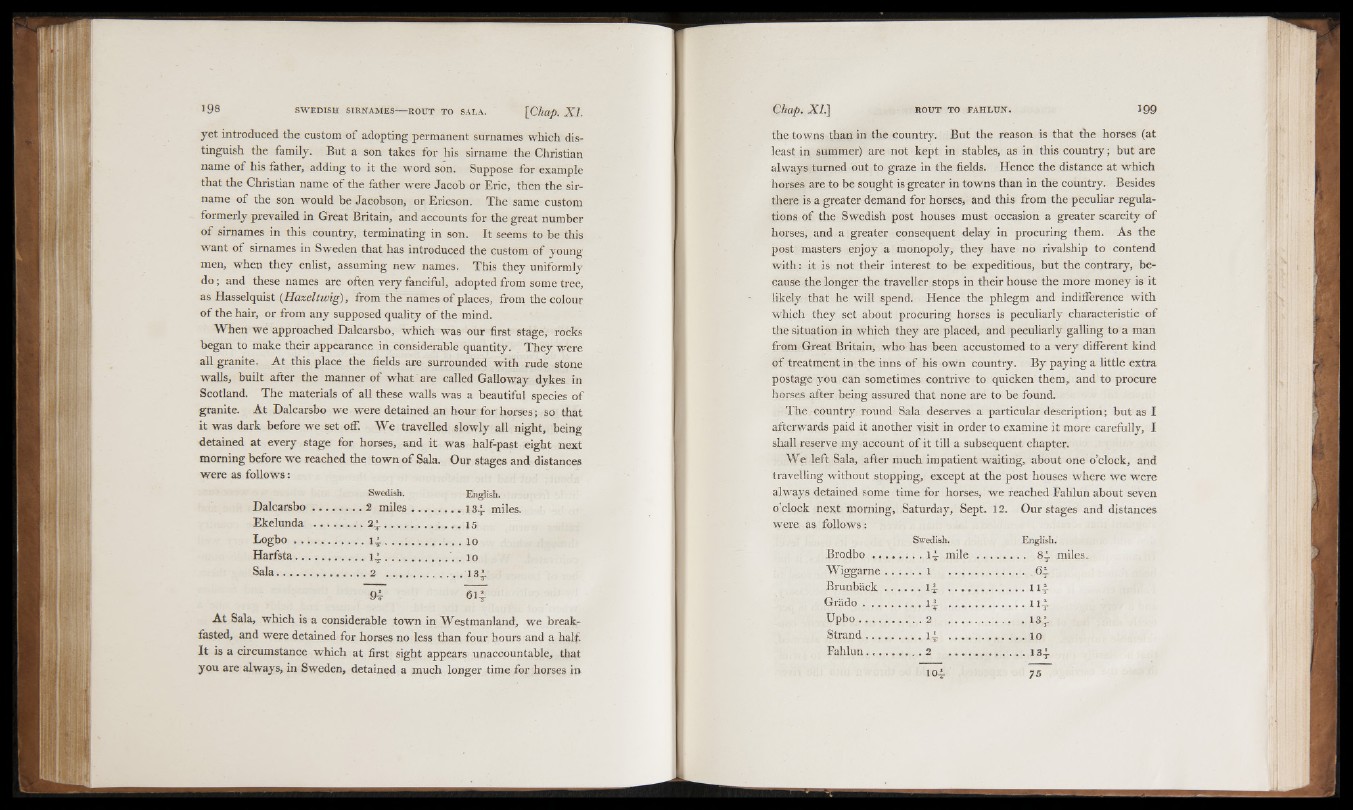
yet introduced the custom of adopting permanent surnames which dis-
tinguish the family. But a son takes for his sirname the Christian
name o f his father, adding to it the word son. Suppose for example
that the Christian name of the father were Jacob or Eric, then the sirname
of the son would be Jacobson, or Ericson. The same custom
formerly prevailed in Great Britain, and accounts for the great number
o f sirnames in this country, terminating in son. It seems to be this
want o f sirnames in Sweden that has introduced the custom o f young
men, when they enlist, assuming new names. This they uniformly
do; and these names are often very fanciful, adopted from some tree,
as Hasselquist {Hazeltwig), from the names o f places, from the colour
o f the hair, or from any supposed quality of the mind.
When we approached Dalcarsbo, which was our first stage, rocks
began to make their appearance in considerable quantity. They were
all granite. At this place the fields are surrounded with rude stone
walls, built after the manner o f what are called Galloway dykes in
Scotland. The materials of all these walls was a beautiful species of
granite. A t Dalcarsbo we were detained an hour for horses; so that
it was dark before we set off. W e travelled slowly all night, being
detained at every stage for horses, and it was half-past eight next
morning before we reached the town o f Sala. Our stages and distances
were as follows:
Swedish. English.
Dalcarsbo
Ekelunda ------K .................
L o g b o ........... .
Harfsta........... .
Sala.................. . . . . 1 3 4 .
94 61*
A t Sala, which is a considerable town in Westmanland, we breakfasted,
and were detained for horses no less than four hours and a half.
It is a circumstance which at first sight appears unaccountable, that
you are always, in Sweden, detained a much longer time for horses in
the towns than in the country. But the reason is that the horses (at
least in summer) are not kept in stables, as in this country; but are
always turned out to graze in the fields. Hence the distance at which
horses are to be sought is greater in towns than in the country. Besides
there is a greater demand for horses, and this from the peculiar regulations
of the Swedish post houses must occasion a greater scarcity of
horses, and a greater consequent delay in procuring them. As the
post masters enjoy a monopoly, they have no rivalship to contend
with: it is not their interest to be expeditious, but the contrary, because
the longer the traveller stops in their house the more money is it
likely that he will spend. Hence the phlegm and indifference with
which they set about procuring horses is peculiarly characteristic of
the situation in which they are placed, and peculiarly galling to a man
from Great Britain, who has been accustomed to a very different kind
of treatment in the inns of his own country. By paying a little extra
postage you can sometimes contrive to quicken them, and to procure
horses after being assured that none are to be found.
The country round Sala deserves a particular description; but as I
afterwards paid it another visit in order to examine it more carefully, I
shall reserve my account of it till a subsequent chapter.
We left Sala, after much impatient waiting, about one o’clock, and
travelling without stopping, except at the post houses where we were
always detained some time for horses, we reached Fahlun about seven
o’clock next morning, Saturday, Sept. 12. Our stages and distances
were as follows:
Swedish. English.
Brodbo
Wiggarne . . ......... 64
Brunback . .warn....... .........H 4
Grad o.......... • • • • H .............. .........114
Upbo........... . . . . 1 3 *-
Strand......... • . • 1 4 ............. .........10
Fahlun......... . . . . . 1 3 *